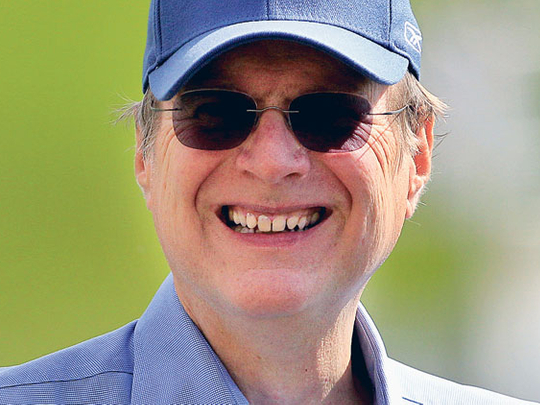
If someone stole your shiny new car, you wouldn't wait until the 86th time you saw someone driving it around town to call the police.
In filing his patent infringement lawsuit against 11 ecommerce companies and internet giants, Microsoft co-founder Paul Allen (above) staked an ownership claim to functions he says his shop developed a decade ago.
In the years that passed between the issuing of the patents and last week's lawsuit, the functions Allen claims were his firm's have become commonplace. You can hardly read or shop online without them.
How fair is that? If these patented inventions really are the basis for essential internet activities, as Allen claims, surely he noticed years ago.
The oldest of the patents dates to March 2000, the most recent to September 2004. What took so long?
One measure of the ubiquity of the contested technology is the list of defendants, from AOL and Apple to Yahoo and YouTube. The list includes innovators such as Google, Facebook, Netflix and EBay, as well as retailers Office Depot, OfficeMax and Staples. The wonder is that Allen stopped at 11.
The lawsuit says those companies infringed patents developed by inventors working in the now-defunct Interval Research Corp, which Allen and David Liddle created in 1992. Interval Research "employed over 110 of the world's leading scientists, physicists, and engineers..." Allen's lawsuit says. Some 300 patents resulted.
Allen held onto the patents through other companies he owned, most recently Interval Licensing LLC, the plaintiff in the case. They cover methods to create pop-ups, alerts and displays that direct users to material related to whatever they're viewing.
Denied claims
The companies commenting on the case deny the claims and pledged to defend themselves.
What gets me is that Allen waited this long to sue.
So any unreasonable or inexcusable delay that hurts his accused infringers will diminish Allen's chances for full recovery. He'll need a really, really good excuse for waiting.
As a multibillionaire who has pledged to give away most of his fortune, he presumably hasn't gone to court for the money.
Maybe, just maybe, Allen didn't care so much before but does now, at 57 and diagnosed late last year with non-Hodgkin's lymphoma, for a second time. Treatment was successful, according to his spokesman. Still, perhaps he's thinking of his legacy.
That's fine by me. Technology loses nothing and gains much when we recognise who set down which part of the foundation of the ever-evolving science we take for granted.
It's just that it would have been fairer to other innovators, including companies now named as defendants, if he had thought of that sooner.











